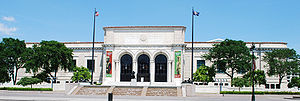Search results
Appearance
There is a page named "Detroit (film)" on Wikipedia
- Detroit is a 2017 American period crime drama film directed by Kathryn Bigelow and written by Mark Boal. It stars John Boyega, Will Poulter, Algee Smith...35 KB (3,602 words) - 21:33, 19 June 2024
- Detroit, Michigan in the United States, has been used as a setting and/or filming location for many Hollywood feature films, as well as several television...12 KB (1,339 words) - 05:40, 6 June 2024
- Detroit Rock City is a 1999 American teen comedy film directed by Adam Rifkin and written by Carl V. Dupré. It tells of four teenage boys in a Kiss tribute...15 KB (1,367 words) - 15:33, 19 June 2024
- The Detroit Film Critics Society is a film critic organization based in Detroit, Michigan, United States. It was founded in 2007, and comprises a group...60 KB (4,665 words) - 20:39, 13 June 2024
- The Detroit Institute of Arts (DIA) is a museum institution located in Midtown Detroit, Michigan. It has one of the largest and most significant art collections...88 KB (9,404 words) - 11:37, 7 June 2024
- Detroit (/dɪˈtrɔɪt/, dih-TROYT; locally also /ˈdiːtrɔɪt/, DEE-troyt) is the most populous city in the U.S. state of Michigan. It is the largest U.S. city...242 KB (22,837 words) - 03:05, 3 July 2024
- Detroit: Become Human is a 2018 adventure game developed by Quantic Dream. The plot follows three androids: Kara (Valorie Curry), who escapes her owner...101 KB (6,842 words) - 18:13, 20 June 2024
- Oregon, U.S. Detroit Lakes, Minnesota, U.S. Detroit River, at the Canada-United States border Detroit Seamount, in the Pacific Ocean Detroit (film), a 2017...4 KB (518 words) - 11:42, 19 August 2023
- Ranam: Detroit Crossing (transl. Battle: Detroit Crossing) is a 2018 Indian Malayalam-language action thriller film written and directed by Nirmal Sahadev...15 KB (1,466 words) - 11:43, 1 May 2024
- Detroit, Michigan, is a major center in the United States for the creation and performance of music, and is best known for three developments: Motown...68 KB (8,255 words) - 21:29, 29 June 2024
- wright.edu. Retrieved November 16, 2023. "The 2013 Detroit Film Critics Society Awards". Detroit Film Critics Society. December 15, 2014. Retrieved January...45 KB (1,412 words) - 13:23, 30 December 2023
- March 12, 2016. Retrieved April 1, 2016. "The 2009 Detroit Film Critics Society Awards". Detroit Film Critics Society. 2009. Archived from the original...110 KB (5,399 words) - 20:57, 27 June 2024
- Film Critics. Archived from the original on February 4, 2012. Retrieved July 25, 2015. "The 2010 Detroit Film Critics Society Awards". Detroit Film Critics...113 KB (5,311 words) - 01:54, 28 June 2024
- Sean Baker (film director))original on 2021-12-06. Retrieved 2021-12-17. "The 2021 Detroit Film Critics Society Awards". Detroit Film Critics Society. Archived from the original on 2021-12-14...49 KB (3,605 words) - 07:51, 2 July 2024
- Detroit Rock City is a 1999 American comedy film about four teenagers in a Kiss cover band who try to see their idols in Detroit in 1978. Directed by Adam
- or $300,000 per annum. In addition to selling films in Ohio, complainant has a film exchange in Detroit, Michigan, from which it rents or leases large
- Introduction to Select Irish Literature and Film The current, editable version of this book is available in Wikibooks, the open-content textbooks collection
)






